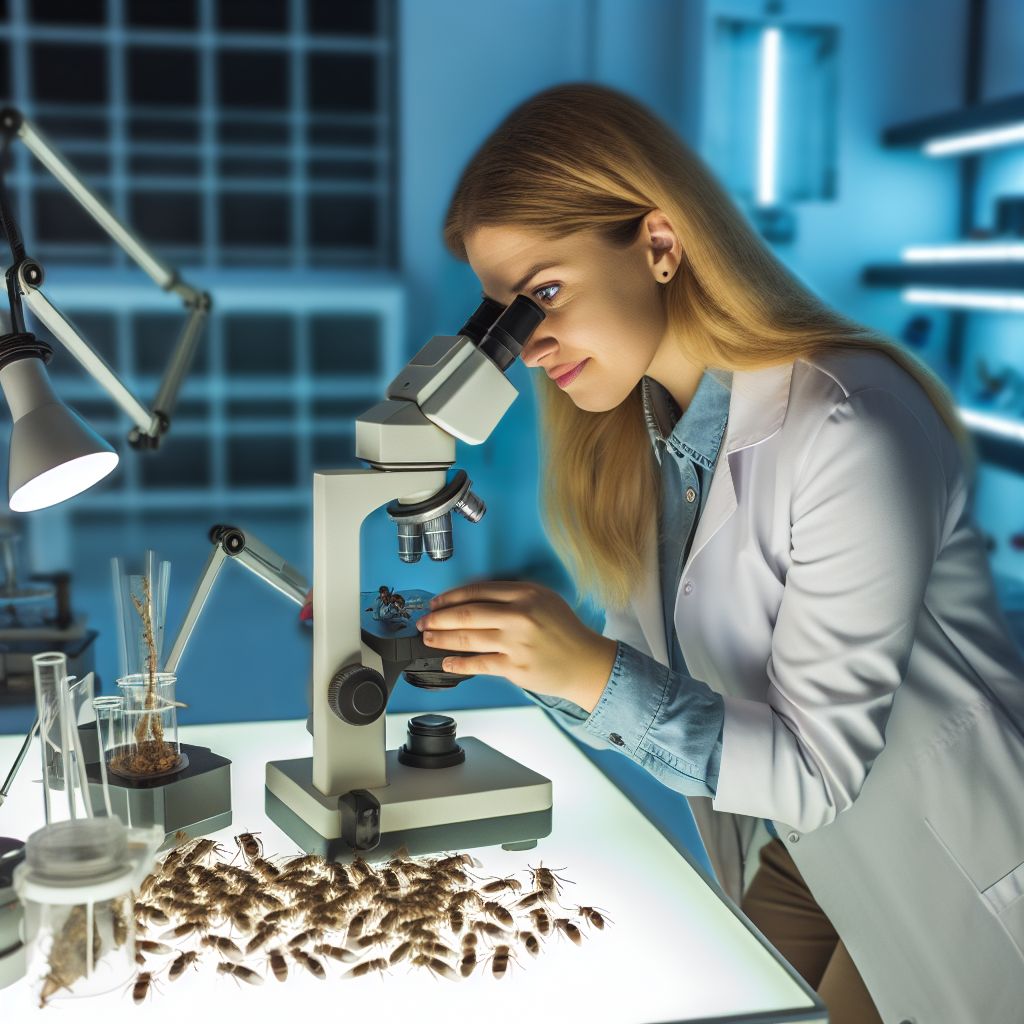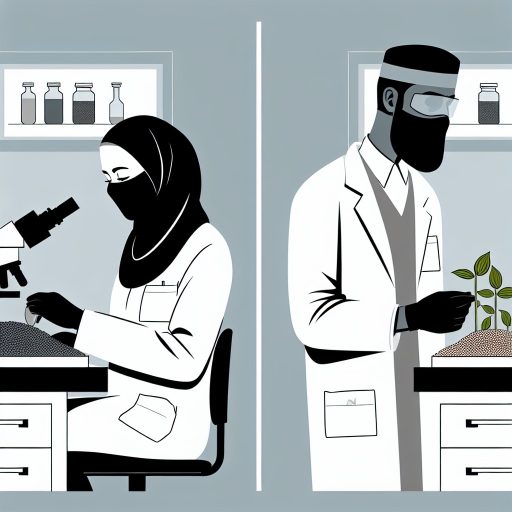Biotechnology is the field of science that involves the use of living organisms or their systems to create products or improve processes.
Entomologists play a crucial role in biotechnology by studying insects and their behavior.
Their work can lead to advancements in various industries.
Exploring Insect Genetics
Entomologists delve into the genetics of insects.
This research unlocks valuable information for biotechnological studies.
Utilizing Insect Biology
Studying insect biology helps entomologists understand their physiology and biochemistry.
These aspects can be harnessed for biotechnological purposes.
Developing Environmentally Friendly Pest Control
Entomologists work on developing environmentally friendly pest control methods using biotechnology.
These methods reduce the need for harmful chemicals.
Enhancing Crop Yield through Insect Studies
Through biotechnology, entomologists improve crop yield by studying how insects interact with plants.
They also develop innovative agricultural solutions.
Contribution to Medical Research and Therapeutics
Entomologists contribute to medical research by studying insects for potential therapeutic purposes.
This aids in the development of new medical treatments.
Entomologists are indispensable in biotechnology due to their expertise in studying insects.
They apply their knowledge to various fields, leading to significant advancements in science and technology.
Overview of Entomologists
-
Definition of entomologists
Entomologists are scientists who specialize in the study of insects.
They study insect biology, behavior, and ecological roles.
-
Specialization in studying insects
Entomologists focus on various aspects of insect life.
These aspects include taxonomy, physiology, genetics, and ecology.
-
Roles in various industries, including biotechnology
Entomologists play a crucial role in biotechnology by applying their knowledge of insects.
They contribute to the development of pest-resistant crops and biological control methods.
Insect-based products also benefit from their expertise.
Additionally, entomologists work on genetic engineering projects.
They create transgenic insects for agricultural and medical purposes.
Furthermore, they research insect behavior and physiology.
This research helps identify targets for biotechnological interventions.
Entomologists play a crucial role in biotechnology.
They study insects and their impact on various aspects of agriculture.
Contribution to Agriculture
- Using insects for pest control
- Genetic modification of insects for improved crop production
- Research on insect-borne diseases affecting crops
Entomologists have significantly contributed to agriculture by utilizing insects for pest control.
They conduct extensive research on using beneficial insects to naturally control harmful pests in crops.
This method is known as biological control.
Transform Your Career Today
Unlock a personalized career strategy that drives real results. Get tailored advice and a roadmap designed just for you.
Start NowIt involves introducing insect predators or parasites to reduce pest populations without harming the environment or human health.
Furthermore, entomologists have been involved in genetic modification of insects to enhance crop production.
By manipulating the genetic makeup of insects, they create strains that are more efficient in pollination or resistant to certain diseases.
This has led to increased yields and improved quality of crops.
Ultimately, these advances benefit both farmers and consumers.
Another important aspect of entomologists’ work in biotechnology is their research on insect-borne diseases that affect crops.
They study interactions between insects, plants, and pathogens to develop strategies for disease management.
By understanding the mechanisms of transmission and infection, entomologists recommend preventive measures.
They also develop resistant crop varieties to combat these diseases effectively.
Entomologists play a pivotal role in biotechnology by contributing their expertise to improve agricultural practices.
Their work in utilizing insects for pest control advances sustainable agriculture and food security.
Genetic modification for crop improvement enhances productivity and quality.
Research on insect-borne diseases supports effective disease management in crops.
See Related Content: How to Build Client Relationships in Irrigation Work
Entomologists play a crucial role in various aspects of biotechnology.
They contribute significantly to medical applications.
Medical Applications of Insect Research
- Study of insects for potential pharmaceuticals
- Research on insect venom for medical treatments
- Role in developing insect-based vaccines
Entomologists study insects to discover compounds for new pharmaceuticals.
They analyze the chemical composition of insects to identify useful substances.
Studying insect venom reveals bioactive compounds with medical benefits.
Scientists develop novel treatments using these venom compounds.
Transform Your Career Today
Unlock a personalized career strategy that drives real results. Get tailored advice and a roadmap designed just for you.
Start NowResearch also explores how insect immune responses aid vaccine development.
This knowledge helps create vaccines that effectively combat diseases.
The work of entomologists in medical biotechnology leads to new treatments.
These advances improve human health and overall well-being.
Explore Further: Education Needed for Seed Technologists
Entomologists play a crucial role in biotechnology.
They especially contribute when it comes to environmental impact.
Here are some key areas where their expertise is essential.
Study of Insect Biodiversity for Conservation Efforts
Entomologists are valuable in assessing and documenting insect diversity.
This work is essential for conservation efforts.
By studying different species of insects, they can help identify endangered species.
They also determine which insects need protection.
Understanding insect biodiversity allows entomologists to analyze ecosystems and their health.
They can determine impacts of habitat loss, climate change, and pollution on insect populations.
This information is crucial to develop strategies to preserve biodiversity.
Maintaining ecosystem balance depends on these strategies.
Research on Insects’ Role in Ecosystem Balance
Entomologists study interactions between insects and their environment.
This helps them understand insects’ role in maintaining ecosystem balance.
Insects play various vital roles, including pollination, decomposition, and nutrient cycling.
For example, bees are essential pollinators for many plant species.
Transform Your Career Today
Unlock a personalized career strategy that drives real results. Get tailored advice and a roadmap designed just for you.
Start NowThis includes important crops.
Without bees, food production would be severely impacted.
By studying these interactions, entomologists identify ways to protect and enhance insect services.
Their work benefits ecosystems worldwide.
Use of Insects for Bioremediation of Environmental Pollutants
Entomologists explore insects’ potential to clean up environmental pollutants.
This process is known as bioremediation.
Some insects can break down or accumulate contaminants in their bodies.
This makes the insects useful for cleaning polluted sites.
For instance, certain insect species metabolize organic compounds or heavy metals.
Doing so reduces the concentration of pollutants in the environment.
By studying such organisms, entomologists develop bio-based solutions for remediation.
Their research provides eco-friendly alternatives to chemical clean-up methods.
Entomologists play a vital role in biotechnology.
They contribute to environmental conservation, ecosystem balance, and pollution remediation.
Their expertise advances scientific research and practical solutions in these areas.
Find Out More: Technologies Used by Modern Dairy Scientists

Innovations in Biomimicry
- Study of insect behavior for technological advancements
- Mimicking insect structures for design and engineering
- Contributions to sustainable development through biomimicry
Entomologists play a crucial role in the field of biotechnology.
They especially impact innovations in biomimicry.
Biomimicry is the practice of studying and imitating nature’s designs and processes.
This approach helps to solve human problems effectively.
Transform Your Career Today
Unlock a personalized career strategy that drives real results. Get tailored advice and a roadmap designed just for you.
Start NowInsects have diverse adaptations and behaviors.
They have been a rich source of inspiration for technological advancements.
Study of Insect Behavior for Technological Advancements
Entomologists study insect behavior to understand navigation mechanisms.
They also analyze how insects communicate with each other.
Insects adapt to different environmental situations effectively.
By observing these behaviors, scientists develop innovative technologies.
These technologies mimic insect behavior for various applications.
Mimicking Insect Structures for Design and Engineering
Insects have evolved unique structures and mechanisms to survive.
Examples include wings, exoskeletons, and sensory organs.
Entomologists examine these structures closely for design inspiration.
One such innovation is thermal management systems inspired by termite mounds.
Contributions to Sustainable Development through Biomimicry
Biomimicry provides sustainable solutions to complex challenges.
It emulates nature’s time-tested strategies for efficiency.
Entomologists identify principles from insect adaptations to advance industries.
For example, energy-efficient building designs are inspired by termite mounds’ air circulation systems.
Entomologists help leverage nature’s wisdom to drive technology forward.
They promote sustainable development by applying insect adaptations to engineering.
This approach results in innovative solutions benefiting humans and the environment.
Find Out More: Fieldwork vs. Lab Work for Agricultural Technicians
Professional Development and Education
- Training programs for entomologists in biotechnology
- Importance of collaboration with other scientific disciplines
- Opportunities for entomologists in biotechnology industries
Training Programs for Entomologists in Biotechnology
Entomologists interested in pursuing a career in biotechnology should consider enrolling in specialized programs.
Transform Your Career Today
Unlock a personalized career strategy that drives real results. Get tailored advice and a roadmap designed just for you.
Start NowThese programs focus on the intersection of entomology and biotechnology.
They provide essential knowledge and skills crucial for success in the field.
Importance of Collaboration with Other Scientific Disciplines
Collaboration with other disciplines such as molecular biology, genetics, and bioinformatics is vital.
By working with experts from different fields, entomologists leverage their unique expertise.
This collaboration contributes to innovative research and development projects.
Opportunities for Entomologists in Biotechnology Industries
Entomologists have numerous roles in biotechnology industries, including research and development.
They also contribute to quality control, regulatory affairs, and product development.
The demand for sustainable solutions in agriculture and public health is growing.
Entomologists with biotechnology expertise are highly sought after by companies developing new technologies.
Role of Entomologists in Biotechnology
Entomologists play a crucial role in biotechnology by exploring the potential of insects.
They investigate insects for various biotechnological applications across industries.
Their studies cover insect behavior, genetics, and physiology to support advancements.
Entomologists have significantly contributed to progress in multiple biotechnological fields.
Future prospects for entomologists in biotechnology are highly promising and impactful.
New discoveries and applications related to insects continue to emerge actively.
It is essential to maintain support and funding for research in this vital area.
Such investment will unlock the full potential of insects in biotechnology innovations.
A collective call for research and collaboration is needed to maximize entomologists’ impact.
Additional Resources
Bt Eggplant: A Personal Account of Using Biotechnology to Improve …
Home | Entomology and Plant Pathology | University of Arkansas
Transform Your Career Today
Unlock a personalized career strategy that drives real results. Get tailored advice and a roadmap designed just for you.
Start Now[E-Books for Sale]
The Big Book of 500 High-Paying Jobs in America: Unlock Your Earning Potential
$19.99 • 500 High-Paying Jobs • 330 pages
Explore 500 high-paying jobs in America and learn how to boost your career, earn more, and achieve success!
See All 500 High-Paying Jobs of this E-Book
1001 Professions Without a Degree: High-Paying American Jobs You Can Start Now
$19.99 • 1001 Professions Without a Degree • 174 pages
Discover 1001 high-paying jobs without a degree! Unlock career tips, skills, and success strategies for just $19.99!




